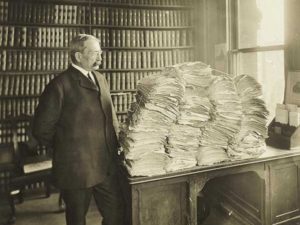 Douglas asked Dallas Performance to install a new camshaft in her 2004 Corvette (example, to the right); while doing so, the company also did about $5,000 in additional engine work. Among other holdings, the Fifth Court rejected the company’s quantum meruit claim, observing Douglas’s testimony that she lacked notice of the work or the company’s expectation of her payment for it, and noting that no jury question asked whether her boyfriend was her authorized representative. Douglas v. Sims, No. 05-17-01187-CV (Feb. 26, 2019).
Douglas asked Dallas Performance to install a new camshaft in her 2004 Corvette (example, to the right); while doing so, the company also did about $5,000 in additional engine work. Among other holdings, the Fifth Court rejected the company’s quantum meruit claim, observing Douglas’s testimony that she lacked notice of the work or the company’s expectation of her payment for it, and noting that no jury question asked whether her boyfriend was her authorized representative. Douglas v. Sims, No. 05-17-01187-CV (Feb. 26, 2019).
Category Archives: Quantum Meruit
 Skyline Commercial v. ISC Acquisition addressed several aspects of the interplay between an express contract and the doctrine of quantum meruit, including:
Skyline Commercial v. ISC Acquisition addressed several aspects of the interplay between an express contract and the doctrine of quantum meruit, including:
- A statement about the scope of a contract, made in response to a motion to transfer venue, did not conclusive resolve the viability of the quantum meruit claim because a party may not judicially admit a question of law;
- The trial court correctly used the applicable Pattern Jury Charge about quantum meruit (reminding, “a trial court should not embellish well-settled pattern jury charges with addendum”); and
- The jury properly weighed conflicting testimony about whether the defendant knew of the relevant orders – and the plaintiff’s expectation of payment for them.
No. 05-17-00028-CV (June 22, 2018) (mem. op.)
 A high-profile fee dispute led to holdings that (1) an attorney can recover in quantum meruit in connection with an oral contingent fee agreement, notwithstanding the other legal problems with such agreements; (2) legally sufficient evidence of the attorney’s “valuable compensable global settlement services” supported the verdict on his quantum meruit theory; (3) claimed error on the narrow scope of a fiduciary duty instruction was not preserved without a specific objection to the scope issue; and (4) the trial court did not abuse its discretion in refusing a spoliation instruction, when evidence showed that the destruction of the relevant emails resulted from a routine upgrade process. Shamoun & Norman, LLP v. Hill, No. 05-13-01634-CV (Jan. 26, 2016). The Court rendered judgment on quantum meruit.
A high-profile fee dispute led to holdings that (1) an attorney can recover in quantum meruit in connection with an oral contingent fee agreement, notwithstanding the other legal problems with such agreements; (2) legally sufficient evidence of the attorney’s “valuable compensable global settlement services” supported the verdict on his quantum meruit theory; (3) claimed error on the narrow scope of a fiduciary duty instruction was not preserved without a specific objection to the scope issue; and (4) the trial court did not abuse its discretion in refusing a spoliation instruction, when evidence showed that the destruction of the relevant emails resulted from a routine upgrade process. Shamoun & Norman, LLP v. Hill, No. 05-13-01634-CV (Jan. 26, 2016). The Court rendered judgment on quantum meruit.
General Capital Group, a German investment firm, claimed that it entered into an oral deal with AT&T in January 2009 to broker the purchase of T-Mobile for a 2% commission on what was to be a $39 billion deal. In May 2009, GC held another meeting with AT&T, during which AT&T indicated it was not interested in pursuing the transaction at that time. After two years with no communication between GC and AT&T, the latter announced that it intended to acquire T-Mobile. GC approached AT&T, which denied that it had any deal with GC.
GC filed suit for breach of contract. During the pendency of the suit, AT&T announced that it was not longer going to pursue the T-Mobile deal due to opposition by the Justice Department. With no sale on which to base its claim for a massive commission, GC changed its theory to to fraud, seeking recovery of $30 million for the “reasonable value of its services.” The trial court granted summary judgment, and the court of appeals affirmed. GC could not recover for fraud because even if AT&T had agreed to a 2% success fee, GC could not show harm because there hadn’t ever been any success for such a fee to be based on. Likewise, GC could not recover for quantum meruit because it has no expectation of being paid unless there was a successful acquisition.
General Capital Group v. AT&T, No. 05-12-00446-CV